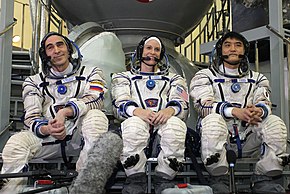cosmos.wikisort.org - Spacecraft
Soyuz MS-01 was a 2016 Soyuz spaceflight to the International Space Station.[4] Originally scheduled for launch in June 2016, the mission successfully lifted off from Kazakhstan on 7 July 2016.[5] It transported three members of the Expedition 48 crew to the International Space Station. Soyuz MS-01 is the 130th flight of a Soyuz spacecraft, and the first with the new version Soyuz MS. The crew consisted of a Russian commander, a Japanese flight engineer, and an American flight engineer.
 Soyuz MS-01 docked to the ISS. | |
| Mission type | ISS crew transport |
|---|---|
| Operator | Roscosmos |
| COSPAR ID | 2016-044A |
| SATCAT no. | 41639 |
| Mission duration | 115 days 2 hours 22 minutes |
| Spacecraft properties | |
| Spacecraft | Soyuz MS |
| Spacecraft type | Soyuz-MS 11F732A48 |
| Manufacturer | RKK Energia |
| Launch mass | 7080 kg |
| Crew | |
| Crew size | 3 |
| Members | Anatoli Ivanishin Takuya Onishi Kathleen Rubins |
| Callsign | Irkut |
| Start of mission | |
| Launch date | 7 July 2016, 01:36 UTC[1] |
| Rocket | Soyuz-FG |
| Launch site | Baikonur, Site 31 ? |
| Contractor | Progress Rocket Space Centre |
| End of mission | |
| Landing date | 30 October 2016, 03:58 UTC [2] |
| Landing site | Steppe of Kazakhstan |
| Orbital parameters | |
| Reference system | Geocentric orbit |
| Regime | Low Earth orbit |
| Inclination | 51.66° |
| Docking with ISS | |
| Docking port | Rassvet nadir |
| Docking date | 9 July 2016, 04:12 UTC [3] |
| Undocking date | 30 October 2016 00:35 UTC |
| Time docked | 113 days |
 (l-r) Ivanishin, Rubins and Onishi Soyuz programme (Crewed missions) | |
On 6 June 2016, the launch was rescheduled to July 2016 due to flaws in the control system that could affect the docking to the ISS.[6] The spacecraft was successfully docked on 9 July 2016 [3] and returned to Earth on 30 October 2016.[2]
Crew
| Position[7] | Crew Member | |
|---|---|---|
| Commander | Expedition 48 Second spaceflight | |
| Flight Engineer 1 | Expedition 48 First spaceflight | |
| Flight Engineer 2 | Expedition 48 First spaceflight | |
Backup crew
| Position[8] | Crew Member | |
|---|---|---|
| Commander | ||
| Flight Engineer 1 | ||
| Flight Engineer 2 | ||
References
- "Crew Launches for Two-Day Ride to Station". NASA. Retrieved 8 July 2016.
 This article incorporates text from this source, which is in the public domain.
This article incorporates text from this source, which is in the public domain. - "Soyuz MS crew return". Roscosmos. Retrieved 30 October 2016.
- Garcia, Mark (9 July 2016). "Expedition 48-49 Crew Docks to New Home in Space". blogs.nasa.gov/spacestation.
 This article incorporates text from this source, which is in the public domain.
This article incorporates text from this source, which is in the public domain. - "Russian Launch Manifest". Retrieved 13 March 2014.
- "First flight of upgraded Russian Soyuz MS spacecraft lifts off for space station". collectSPACE.
- "Launch of new series manned spacecraft rescheduled due to risk of docking disruption". TASS. 6 June 2016.
- Планируемые полёты. astronaut.ru (in Russian). Retrieved 13 March 2014.
- "Планируемые полёты". astronaut.ru (in Russian). 2015.
На других языках
- [en] Soyuz MS-01
[es] Soyuz MS-01
Soyuz MS-01 fue la primera misión de una nave Soyuz MS, lanzada el 7 de julio de 2016 mediante un cohete Soyuz-FG desde el Cosmódromo de Baikonur, en Kazajistán.[3] Transportó a tres miembros de la tripulación de la Expedición 48 hacia la Estación Espacial Internacional. MS-01 fue el vuelo número 130 de una nave espacial Soyuz. El equipo estuvo compuesto por un comandante ruso, un ingeniero de vuelo japonés, y un ingeniero de vuelo estadounidense.[4][ru] Союз МС-01
«Союз МС-01» («Союз МС») — стартовавший 7 июля 2016 года российский космический корабль, который 9 июля доставил на международную космическую станцию троих участников экспедиции МКС-48/ 49[2]. Это 128-й пилотируемый полёт кораблей серии «Союз».Текст в блоке "Читать" взят с сайта "Википедия" и доступен по лицензии Creative Commons Attribution-ShareAlike; в отдельных случаях могут действовать дополнительные условия.
Другой контент может иметь иную лицензию. Перед использованием материалов сайта WikiSort.org внимательно изучите правила лицензирования конкретных элементов наполнения сайта.
Другой контент может иметь иную лицензию. Перед использованием материалов сайта WikiSort.org внимательно изучите правила лицензирования конкретных элементов наполнения сайта.
2019-2025
WikiSort.org - проект по пересортировке и дополнению контента Википедии
WikiSort.org - проект по пересортировке и дополнению контента Википедии


